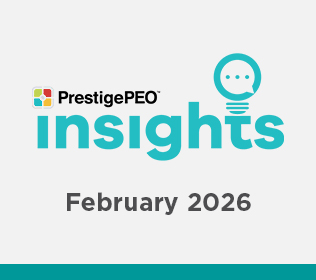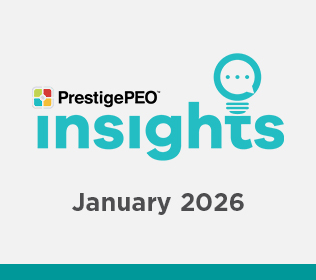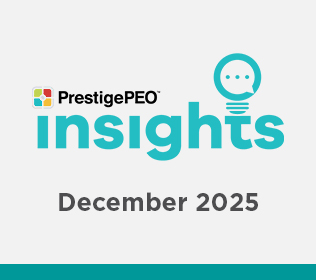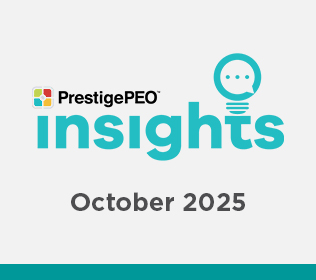
The latest news relevant to you and your business


Take Advantage of 401(k) Tax Credits Under SECURE 2.0
Is Your Business Missing Out on Valuable Tax Credits? According to an AARP survey, 57 million Americans lack access to a retirement plan through their employer, which the SECURE Act 2.0 aims to change.
If you’re a small or medium-sized business, now is the time to take advantage of significant federal tax incentives to help you start or enhance your company’s retirement plan, while improving employee satisfaction and retention.
Under SECURE 2.0, eligible businesses with fewer than 100 full-time employees can qualify for:
- 50–100% tax credits on plan startup and administrative fees (up to $5,000/year for 3 years)
- Up to $1,000 per employee in tax credits for employer contributions
- $500/year in credits for including automatic enrollment
At PrestigePEO, we simplify retirement planning through our Multiple Employer Plan (MEP), giving your business access to competitive 401(k) options. At the same time, we take on the administrative burden as the plan sponsor, administrator, and trustee.
Let us help you strengthen your workforce and bottom line with a plan built for today’s business needs.
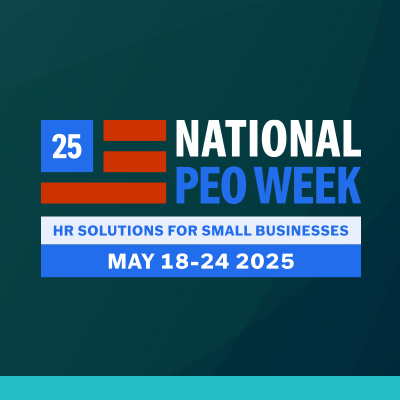
Celebrating National PEO Week: A Commitment to Your Business Success
Thank You for Being Part of the PEO Movement
This week marks National PEO Week, a time to recognize the incredible impact that Professional Employer Organizations (PEOs) have on small and mid-sized businesses nationwide.
According to NAPEO, businesses that partner with a PEO grow 7–9% faster, are 50% less likely to fail, and experience 10–14% lower employee turnover than those that don’t.
We’re proud to be part of this national movement, supporting businesses like yours with expert guidance in HR, employee benefits, compliance, payroll, and more. National PEO Week celebrates the powerful partnership we share with our clients and a renewed promise to deliver the tools and support you need to succeed.
Thank you for trusting PrestigePEO as your partner. We’re proud to help your business grow and thrive — not just this week, but every day of the year.

May is Mental Health Awareness Month
Workplace Support Starts with Mental Health
May is Mental Health Awareness Month, a time to recognize the importance of emotional well-being in our personal and professional lives.
Did you know that 1 in 5 U.S. adults live with a mental health condition? As part of our commitment to supporting your team, we’re providing valuable resources to help you foster a healthier, more supportive workplace.
Below, you’ll find:
- A featured blog post on the importance of offering mental health benefits to your workforce
- A reminder about two impactful resources available to your team:
- Employee Assistance Program (EAP): Confidential access to professional counselors for support with stress, family and marital concerns, legal and financial issues, substance abuse, and more
- Monument: A private, online platform offering alcohol counseling, virtual support groups, and digital tools — all from the comfort of home
In moments of crisis, immediate help is available. The 988 Suicide & Crisis Lifeline offers 24/7 free and confidential support for anyone in distress, along with prevention resources for individuals and professionals.
We hope you’ll take a moment this month to reflect on the importance of mental health in the workplace and explore the tools available to support yourself and your team.

Support That’s Always Within Reach
Your EAP Resource for Mental Health Awareness Month
With May being Mental Health Awareness Month, this is a great time to remind your team that help is always within reach.
Through our partnership with National EAP, your employees can access confidential, 24/7 support for personal and work-related challenges, including stress, mental health concerns, family issues, legal or financial difficulties, and more.
From short-term counseling to online self-help tools, National EAP is designed to support emotional well-being, resilience, and productivity.

First 100 Days of the New Administration: Impact on Employers
Catch Up on Key Policy Changes Affecting Your Business
The workplace is already feeling the effects of the new administration. Are you prepared?
In case you missed it, our recent webinar featured legal and HR experts Carrie Lambeth Pilon and Abram Finkelstein as they unpacked the key policy shifts impacting employers today, including:
- New and revoked Executive Orders
- Agency-level changes
- Court rulings shaping compliance
- Actionable strategies for adapting to the “new normal”
It’s not too late to catch up. The full recording is now available, and it is filled with insights to help you stay compliant and proactive in 2025 and beyond.

2025 Wage & Hour Compliance: What’s Changing and How to Stay Ready
Prepare for 2025 Wage & Hour Changes in NY, NJ, CT & CA
June 4, 2025, | 2:00 PM EST
Wage & Hour laws are changing in 2025, are you ready?
Join us on June 4, 2025, for a practical compliance update with Joey McCormick and Jessica Viola from PrestigePEO. This must-attend webinar will cover the latest wage and hour changes affecting employers in NY, NJ, CT, and CA, plus key federal updates.
Topics include:
- FLSA exemption classifications
- Overtime rules & common pitfalls
- Federal vs. state law conflicts
- Minimum wage & salary threshold changes
- DOL audit triggers & best practices
- DOL Halts Use of New Independent Contractor Rule, May Enforce Select Cases with Approval
- Timekeeping tools for compliance
This is the ideal session for HR, payroll, and business leaders looking to stay compliant and avoid costly missteps.

Key Compliance Updates for Your Business
ADA Ruling Expands Employer Obligations
In our previous article on Tudor v. Whitehall Central School District, we discussed how the Second Circuit Court of Appeals clarified that employers may be required to provide reasonable accommodations under the Americans with Disabilities Act (ADA) even when an employee can perform the essential functions of their job without one. This insight remains timely and increasingly important, reflecting a broader, consistent interpretation emerging across the country.
While the Tudor decision directly applies to employers in the Second Circuit (New York, Connecticut, and Vermont), other federal appellate courts have already taken similar positions. The First (Maine, Massachusetts, New Hampshire, Puerto Rico, Rhode Island), Fifth (Texas, Louisiana, Mississippi), Sixth (Michigan, Ohio, Kentucky, Tennessee), Ninth (California, Arizona, Nevada, and others), Tenth (Colorado, Utah, Kansas, and others), Eleventh (Florida, Georgia, Alabama), and D.C. Circuits all agree that the ability to perform the job does not negate the need to assess and, where appropriate, provide reasonable accommodations.
This alignment signals that employers outside the Second Circuit should not rely solely on whether an employee performs well without support. Just because someone meets expectations does not automatically relieve an employer of its duty to explore and possibly provide accommodation.
This trend also underscores the need for HR professionals and managers to remain cautious when revising policies, re-evaluating long-standing accommodations, or responding to new requests. Even neutral policy changes, like the one in Tudor, which prohibited leaving campus during prep periods, can inadvertently revoke accommodations that should remain in place unless they create an undue hardship.
The ADA requirement to engage in an individualized, interactive process remains unchanged. What has shifted is the growing judicial consensus that this process must occur regardless of current performance levels, which is a subtle but essential distinction that employers should incorporate into their disability accommodation practices.
We encourage employers to revisit internal training and documentation protocols and ensure decision-makers understand this broader legal trend. Compliance isn’t the only goal; it’s also cultivating a fair and consistent workplace culture that balances business needs with employee well-being.
Navigating ADA compliance can be complex, especially as case law evolves. PrestigePEO is here to help. Please contact your HRBP for assistance with compliance questions.
California - Meal Period Waivers in the wake of Bradsbery v. Vicar Operating, Inc.
California employers now have much-needed clarity on a key wage and hour issue affecting non-exempt employees. In a major update, the California Court of Appeal ruled on April 21, 2025, in Bradsbery v. Vicar Operating, Inc., that written, advance (“blanket”) waivers of 30-minute meal breaks are enforceable for shifts lasting between five and six hours—as long as the waiver is voluntarily signed, freely revocable, and not coerced.
Previously, there was confusion about whether these prospective waivers—often signed at the start of employment—were valid or if a waiver had to be signed each time an employee worked a qualifying short shift. The Bradsbery decision confirms that advance waivers are legal when done properly, resolving an unsettled area of California law.
Under Labor Code Section 512, California employees are guaranteed a thirty (30) minute off-duty meal period after five (5) hours of work and a second off-duty meal period after ten (10) hours of work. This same section does allow for waiver of the first meal period when an employee is working a shorter shift of between five (5) and six (6) hours. In order for that 30-minute off-duty meal period to be waived, it must be by mutual consent of both employer and the employee.
In Bradsbery v. Vicar Operating, Inc. the dispute was not whether it was permissible for the meal period to be waived but rather involved the enforceability of a prospective waiver signed by the employees who brought the dispute and whether they would be considered valid as a waiver for one meal period or for all waivable meal periods during the duration of their employment. The employer argued that the waiver could be revoked at any time should the employee(s) no longer consent to waiving the waivable meal periods. The trial court ruled that the waivers the employees signed were valid for all waivable meal periods. The Appeals court upheld the trial court’s decision asserting that signed, fully revokable prospective waivers of meal periods for employee shifts between five and six hours are valid and enforceable.
What does this ruling mean for California employers?
This ruling by the Court of Appeal provides additional clarity for employers. While the Labor Code allowed for the waiver of certain meal periods it does not provide guidance on how to achieve the requisite mutual consent. The Court has made it clear that should employees sign a revokable prospective waiver; it will satisfy the mutual consent requirement.
Meal Period Waivers – What should employers do?
It is in the employer’s best interest to have a voluntary stand-alone meal period waiver for employees to review and sign. This way it is not hidden in a handbook, or elsewhere, where there is the potential for ambiguity with respect to whether the employee signed the waiver of their own volition. Along with the stand-alone waiver, employers should clearly communicate what the waiver is, that it is voluntary, and the revocation process to their employees should they choose to sign it.
PrestigePEO is here to help! If you are a California employer and have questions about meal break waivers, please reach out to your HRBP for assistance.
California – Proposed Legislation for 2025 Legislative Session
The California legislature is gearing up for another busy legislative session in 2025 and there are about eight employment law-based bill proposals pending. As the legislative session ends in October 2025, PrestigePEO will continue to monitor the progress of the pending legislation and provide updates as they are available. Below are brief summaries of what is potentially on the horizon in The Golden State.
Senate Bill 261 – Civil Penalty
This bill would impose a civil penalty on employers who fail to pay court judgments related to unpaid wages. If passed: Employers could face added financial liability for unresolved wage disputes.
Senate Bill 590 – Sick Leave Expansion
This bill proposes expanding the definition of family to include a seriously ill designated person. The designated person would be an individual who is not related to an employee but who has a relationship with an employee that is the equivalent of family. Should this proposed bill be passed into law, California would be joining other states, such as Minnesota and Oregon, with similar definitions under their state leave laws. If passed: Employers may need to revise sick leave policies and track non-family designees.
Senate Bill 642 – Wage Transparency & Pay Scales
This bill proposes that when employers are posting salary or hourly wage ranges that the pay scale provided are required to be within 10% above or below the mean pay rate within that salary/hourly wage range. Additionally, this law seeks to update the existing state law to be more inclusive updating verbiage that employers cannot pay an employee a salary or wage rate less than employees of the opposite sex to employees of another sex. If passed: Employers must align pay ranges with actual data and update equal pay policies, increasing compliance and audit burdens.
Assembly Bill 1015 – State Discrimination and Harassment Training Requirement
This bill proposes the ability of employees to provide a certification of completion that the employee has completed the mandatory training within the last two years as a way to satisfy the state requirement for training. If passed: Employers may accept external training certifications but must track and verify compliance.
Assembly Bill 1018 – AI & Employment Decisions
This bill proposes regulations for using artificial intelligence to make employment decisions and would provide employees with an opt-out option from such automated systems. If passed: Employers must ensure transparency, provide opt-outs, and closely monitor AI use in HR processes.
Assembly Bill 1234 – Wage Theft Investigations
This bill proposes updates to the process of wage theft investigations by the labor commissioner. It looks to formalize a timeframe for hearings, decisions, and/or awards by requiring a hearing within 90 days of the issuance of a formal complaint and 15 days from such hearing to issue an award, decision, or order. If passed: Employers must respond quickly to complaints and ensure proactive wage and hour compliance.
Assembly Bill 1331 – Workplace Surveillance
This bill would restrict surveillance of employees, prohibit monitoring in private/off-duty areas, and allow employees to disable surveillance tools when off duty.
If passed: Employers must revise surveillance practices and could face penalties for non-compliance.
Assembly Bill 1371
This bill expands employee rights to refuse unsafe work, particularly heat-related tasks, and requires continued wage payments during unsafe conditions. It also prohibits retaliation.
If passed: Employers must pay wages during refusals, address safety complaints promptly, and update non-retaliation policies—raising compliance obligations.
PrestigePEO is here to help! Should you have additional questions concerning these proposed legislative changes and how they may impact your organization, please contact your HR Business Partner.
Colorado Poised to Ban Non-Compete Agreements for Healthcare Providers
Colorado lawmakers have passed a bill prohibiting non-compete agreements with healthcare providers, signaling a significant shift in how employers in the healthcare sector can safeguard their business interests. The bill, approved on April 21, 2025, now awaits the governor’s signature. If signed into law, it will take effect on August 6, 2025, and will apply to any non-compete agreements entered into or renewed after that date.
The legislation prohibits employers from entering into or enforcing non-compete agreements with physicians, physician assistants, nurses, dentists, and midwives. Colorado’s current exception allowing non-compete agreements for highly compensated workers will no longer apply to these roles. The bill also clarifies that agreements cannot prevent healthcare providers from informing their patients about the provider’s ongoing practice, new contact information, or the patient’s right to choose their provider. This provision aims to protect patient autonomy and ensure continuity of care.
While the bill limits employers’ ability to restrict post-employment competition, it preserves certain business rights. Non-compete clauses may still be enforceable when linked to the sale of a business. Companies involved in mergers or acquisitions should assess how restrictive covenants are structured in transaction documents. The bill’s guidance on equity-based compensation and sale-related non-competes will necessitate more careful drafting to ensure enforceability.
Colorado employers, particularly in healthcare, should review their employment agreements now. While existing contracts remain unaffected, new or renewed agreements must comply with the new law after the effective date. Relying on non-compete clauses will no longer be an option for healthcare providers, so businesses may need to implement alternative strategies to protect proprietary information and retain talent.
This development continues a broader national trend of reducing the use of restrictive covenants, particularly in public health and safety industries. Employers should monitor these developments and be prepared to adjust their agreements and policies as necessary.
PrestigePEO is here to help your business maintain compliance and stay ahead of the curve. Please get in touch with your HRBP with any questions you may have.
EEO-1 Window Reportedly Opens in Less Than a Month with a June 24, 2025 Filing Deadline
On Monday, May 20, 2025, the 2024 EEO-1 Component 1 Report data collection will reportedly open. According to updates, the EEOC will require that all employers that had at least 100 or more employees and federal contractors with at least 50 employees employed from October through December 2024, file their reports no later than Tuesday, June 24, 2025. Employers are reminded that if the minimum employee threshold is met at any time during the October through December timeframe, an EEO-1 report is required to reflect the “workforce snapshot period,” for reporting purposes.
As of the date of this publication, the EEOC’s official website has not yet been updated, however multiple sources confirm the May 20th opening date, with the June 24, 2025, filing deadline. We recommend that all employers begin preparing now. Employers are encouraged to ensure HR systems are ready to provide the required data regarding workforce demographics, including race/ethnicity, gender, and job category for each employee. Employers should ensure that demographic information is accurate and reflects voluntary self-identification when available. Reporting will also include both onsite and remote employees.
PrestigePEO helps to support this process by working with clients to ensure the demographic information is complete and updated for reporting purposes. PrestigePEO will generate and upload the final report to the EEO-1 reporting portal for client review, approval, and to ultimately certify. Importantly, PrestigePEO is not able to certify a client’s final EEO-1 report. This is a client specific responsibility.
When the portal opens, clients who have yet to report with Prestige’s assistance or possibly never filed an EEO-1 report in the past must register with the EEOC and list PrestigePEO as a contact/third party by using the following email address: eeo-1reporting@prestigepeo.com.
While the June 24, 2025, deadline is tentative in nature, clients are encouraged to review their EEO-1 reporting obligations and address any outstanding registration requirements soon.
We will continue to monitor updates and provide further guidance once the EEOC formally posts the filing instructions and deadline on its site.
PrestigePEO is here to help. If you have any questions regarding EEO-1 reporting requirements, please contact your HRBP for help.
Executive Order Limiting Disparate Impact Enforcement
A recent executive order alters how federal agencies enforce anti-discrimination laws, specifically targeting the use of “disparate impact” analysis. This legal theory examines whether neutral employment policies unintentionally harm protected groups, even in the absence of intent to discriminate. The government will reduce enforcement efforts while this discrimination remains unlawful under federal law.
The executive order aims to reduce the federal government’s role in enforcing these claims by directing federal agencies, including the EEOC and the Department of Justice, to suspend enforcement actions based on disparate impact claims. It also calls for reviewing and potentially reversing existing settlements and regulations that rely on these theories.
Employers can now anticipate fewer federal investigations and lawsuits stemming from unintentional discrimination. However, intentional discrimination and disparate treatment continue to be illegal and enforceable under Title VII and other laws. Additionally, many states and cities (such as California, New York, and Massachusetts) still permit disparate impact claims under their laws. These laws remain in effect, regardless of changes at the federal level.
Even though federal enforcement is slowing down, reviewing your policies for potential adverse impacts remains essential. Conducting impact analyses during hiring, layoffs, or policy changes can help you stay ahead of risks, particularly in states with strong anti-discrimination laws.
Finally, legal battles concerning this executive order are likely. Courts may block certain parts, or future administrations might reverse it. Until then, the most effective path forward is a balanced approach, involving compliance with state laws and monitoring federal developments.
PrestigePEO will continue to monitor developments that impact your workplace. If you have any questions about these developments, please get in touch with your HRBP.
USCIS Releases Updated Form I-9 and E-Verify Terminology Changes
On April 2, 2025, the U.S. Citizenship and Immigration Services (USCIS) released a new version of Form I-9, which all U.S. employers must use to verify the identity and work authorization of new hires. While the changes are primarily editorial, they reflect updated federal terminology and privacy guidance and may require employers to review and adjust onboarding processes and internal systems.
Key Form I-9 Updates
The latest Form I-9, dated January 30, 2025, expires on May 31, 2027, and includes three changes:
- The term “gender” is now “sex” in two List B identity document sections.
- “Noncitizen authorized to work” has reverted to “alien authorized to work” in Section 1.
- The DHS Privacy Notice states that DHS may share the information provided on the form with authorized organizations.
Valid Form I-9 Editions
As of now, the following three versions of Form I-9 remain valid:
- August 1, 2023 edition, expiring July 31, 2026
- August 1, 2023 edition (re-released August 2, 2024), expiring May 31, 2027
- January 30, 2025 edition, expiring May 31, 2027
Employers can use these forms until they expire. If you have the July 2026 version, update your systems by that date to reflect the new expiration. The edition and expiration date are located in the top-right corner of the form.
E-Verify Language Update
As of April 3, 2025, E-Verify will use “An alien authorized to work” instead of “A noncitizen authorized to work.” Employers should use this term in E-Verify cases, regardless of the Form I-9 version.
Action Items for Employers
- Review and begin using the January 30, 2025 Form I-9 as appropriate.
- Confirm internal systems reflect the correct expiration dates for all valid forms.
- Train staff to select the correct citizenship status in E-Verify.
- Review onboarding protocols to ensure compliance with updated language.
PrestigePEO is here to help. If you have questions about implementing these changes or ensuring compliance, please contact your HRBP for further guidance.
New Wyoming Law Limits Non-Compete Agreements
A significant and impactful change is on the horizon for employers in Wyoming. Starting July 1, 2025, a new state law will render most non-compete agreements unenforceable. This marks a departure from the previous norm, where Wyoming employers could utilize non-competes if deemed reasonable. The new law, however, shifts this standard, making most agreements unenforceable unless they meet specific exceptions.
The law states that, moving forward, employees cannot be prevented from working and earning a living. The only exceptions are when the non-compete clause is part of a business sale, when it protects trade secrets, when it allows employers to recoup certain training or relocation costs, or when it pertains to executives, managers, or key support staff.
Doctors are specifically protected, as previously reported in our February Insights. Any non-compete agreement between physicians, including those in business or partnership agreements, will be void, and doctors may inform patients with rare conditions how to contact them after they switch practices.
Importantly, this law only applies to agreements signed on or after July 1, 2025. Existing agreements made before that date are still valid, but employers must be careful. Changing those agreements after July 1 could bring them under the new law’s rules. Even minor updates might mean the agreement is no longer enforceable.
Several other questions remain. It’s unclear whether other restrictions, such as non-solicitation agreements or confidentiality clauses, will be deemed non-competes under this law. It’s also uncertain who qualifies as an “executive” or “management” employee and whether an employee must satisfy the executive or trade secret exceptions when signing the agreement, leaving the job, or both. Franchise businesses may also face uncertainty, as it’s ambiguous whether their agreements are considered part of a business sale.
Wyoming employers should carefully review their current agreements in the coming months, identify which employees may fall under the limited exceptions, and strengthen their trade secret protections. While existing agreements may still be utilized, it is crucial to exercise caution, especially when considering any updates or renewals.
This new law marks a significant change in how Wyoming businesses can protect themselves. Employers should prepare before the law goes into effect this summer.
PrestigePEO is here to help your business maintain compliance and stay ahead of the curve. Don’t hesitate to contact your HR Business Partner with any questions.
NYC – Delivery Worker Minimum Wage Increase
New York City has finalized the nation’s first minimum pay rate for app-based restaurant delivery workers, setting it at $21.44 per hour before tips as of April 2025. This final rate reflects both a 7.41% inflation adjustment and the full implementation of the city’s groundbreaking 2023 minimum pay rule, which established the first-ever hourly wage standard for this workforce. Designed to move delivery workers beyond unpredictable, tip-dependent earnings, the rule required phased increases to reach the current rate. Enforced by the NYC Department of Consumer and Worker Protection (DCWP), the law began taking effect in late 2023 to address wage disparities in the gig economy, where some workers previously earned as little as $5.39 per hour.
Employers that use third-party delivery platforms—such as DoorDash, Uber Eats, Grubhub, Postmates (now part of Uber Eats), and Relay Delivery—should confirm that these vendors are complying with New York City’s minimum pay rule for app-based delivery workers.
PrestigePEO is here to support you. If you have any questions, please contact your HR Business Partner.
Ohio Employers Can Now Post Labor Law Notices Online
Ohio’s Senate Bill 33, passed by the 136th General Assembly, allows employers to post certain labor law notices on the internet instead of only displaying them in the workplace. This new law updates several sections of the Ohio Revised Code to reflect the realities of today’s digital and remote work environments.
What Changed?
Previously, employers were required to post labor law notices in a physical location—like a breakroom or hallway bulletin board—where employees could easily see them. With this new law, employers now have the option to post notices online, as long as employees can easily access them.
What Can Be Posted Online?
Under the new law, the following notices may be posted online:
- Youth employment law summaries
- Minimum wage summaries
- Anti-discrimination notices
- Prevailing wage schedules for public projects
- Workers’ compensation coverage notices
- Substance abuse testing policies
- Public employer safety and risk reduction information
Employer Requirements
If employers choose to post notices online, they must ensure that:
- Employees have easy access to the information
- The notices are kept current
- The format is clear and readable
In some cases, especially when not all employees have reliable internet access, notices may still need to be posted physically.
Why It Matters
This law gives Ohio employers more flexibility, especially for those with hybrid or remote teams. It also helps reduce the need for physical postings while keeping employees informed of their rights.
Takeaway:
Ohio employers can now use online tools to meet labor law posting requirements—but they must ensure the information is accessible and compliant. Now is a good time to review your posting practices and update systems accordingly.
PrestigePEO is here to help. If you have questions about these changes or ensuring compliance, please contact your HRBP for further guidance.
What You Should Know About DEI-Related Discrimination at Work
On March 19, 2025, the U.S. Equal Employment Opportunity Commission (EEOC) and Department of Justice (DOJ) issued new guidance clarifying how Title VII of the Civil Rights Act of 1964 applies to Diversity, Equity, and Inclusion (DEI) programs. While “DEI” is not defined in the statute, employment decisions motivated in whole or part by race, sex, or other protected characteristics may violate federal law.
Key Takeaways:
- Title VII Applies to All Employees Equally
The EEOC reaffirmed that Title VII protections apply to all workers, not just underrepresented groups. The term “reverse discrimination” is misleading, discrimination is unlawful regardless of who is affected.
- Protected Trait Considerations in DEI Decisions Are Prohibited
Employers may not consider race, sex, or other protected traits in employment decisions—even as just one factor. Title VII does not allow exceptions for diversity goals or client preferences.
- Risk Areas in DEI Programs
Several standard practices may be unlawful if access is restricted based on protected characteristics:nternships and leadership programs
- Mentorships or sponsorships
- Networking opportunities or ERGs
- Segregated training or group assignments
- DEI Training Could Trigger Legal Risk
Training with discriminatory content or implementation may support a hostile work environment claim. Employers should ensure that content is neutral and inclusive. - Retaliation for Opposing Unlawful DEI Practices is Prohibited
Title VII bars retaliation against employees who raise concerns or file complaints about DEI programs they believe are discriminatory.
What Employers Should Do Now:
- Review DEI policies and training for compliance.
- Ensure equal access to programs for all employees.
- Train HR and managers on neutral practices.
- Consult counsel before implementing DEI changes.
PrestigePEO is here to help. If you have questions about ensuring compliance, please contact your HRBP for further guidance.
Florida’s CHOICE Act Sets New Standards for Enforcing Garden Leave and Noncompete Agreements
Effective July 1, 2025, Florida’s CHOICE Act (Contracts Honoring Opportunity, Investment, Confidentiality, and Economic Growth) introduces new rules for enforcing garden leave and noncompete agreements. The law strengthens protections for employers while setting clear standards for high-earning employees.
A covered employee is defined as someone earning more than twice the average wage in their Florida county—either where the employer is based or, if the employer is out of state, where the employee resides. For example, a remote employee living in Broward County who works for a Georgia-based company would be considered covered if their salary exceeds twice the average wage in Broward County. Licensed healthcare professionals are excluded from this definition.
A garden leave agreement allows an employer and employee to agree—up to four years in advance—that written notice is required before ending the employment relationship. During the notice period, the employer must continue paying the employee’s salary and providing benefits, even if the employee stops working after 90 days. Employers must provide at least seven days for review and notify the employee of their right to seek legal counsel.
A noncompete agreement must be in writing, apply for no more than four years, and include a defined geographic scope. It must also confirm that the employee had access to confidential information or customer relationships. Any time spent on garden leave will reduce the length of the noncompete period.
If either agreement is breached, courts are required to issue an injunction unless the employee proves they are not using confidential information or performing similar work. Employers may reduce compensation or benefits during the notice or noncompete period in cases of gross misconduct.
Key takeaways for employers: The CHOICE Act applies only to high earners. It requires specific notice provisions and legal disclosures. Garden leave and noncompete agreements are enforceable but must meet strict conditions. Legal review is recommended to ensure compliance.
PrestigePEO is here to help. Contact your HRBP with any questions.
How Employers Can Navigate Employee Speech in a Divided Workplace
As social and political tensions rise, employee speech—whether online, in the office, or during off-hours—has become a challenging issue for employers. Understanding when you can take action and when speech is legally protected is key to maintaining a respectful and compliant work environment.
Social Media and Off-the-Clock Speech
Private employers generally aren’t bound by the First Amendment, but several states (including New York, California, and Colorado) protect employees from being disciplined for legal political activity outside of work. If an employee shares a controversial opinion that doesn’t disrupt operations, termination or discipline could expose your business to legal risk. Posts tied to workplace concerns (e.g., wages or discrimination) may also be protected under the National Labor Relations Act (NLRA), even in non-union settings.
Political Talk in the Workplace
The NLRA shields workers who discuss job-related conditions. However, employers can set limits when conversations become disruptive or create a hostile environment. Focus on maintaining respectful conduct—regardless of political views—and apply policies consistently. Train supervisors to de-escalate tense discussions and avoid expressing personal opinions.
Protests and Walkouts
Not all protests are treated equally under the law. Walkouts connected to workplace issues (like working conditions or discrimination) may be protected, while those tied solely to political causes likely are not. Avoid quick discipline—review the nature of the protest and consult legal counsel when in doubt.
Dress Code Challenges
If you ban clothing with slogans, the rule must apply across the board. Favoring certain viewpoints or messages over others can lead to claims of bias. Review your dress code to ensure it’s neutral and clearly tied to workplace standards like professionalism or safety.
Managerial Responsibilities
Managers should not promote or discuss personal political views with staff. These conversations can create pressure or even lead to legal complaints. Provide leadership training and ensure employees have safe ways to report concerns.
Key Takeaway:
Clear, neutral policies and even-handed enforcement are critical. Stay informed about state laws, document decision-making, and seek legal input before responding to speech-related issues.
PrestigePEO is here to help.
New Jersey Moves to Eliminate Tip Credit—What Employers Need to Know
On the heels of ongoing wage reform efforts, New Jersey has enacted legislation that significantly impacts the way employers compensate tipped workers. The new law phases out the tip credit allowed under the state’s minimum wage law, ultimately requiring all employers to pay tipped employees the full minimum wage in cash—regardless of tips received—by 2030.
Key Provisions of the Bill
- Gradual Elimination of Tip CreditUnder current law, employers can take a tip credit—meaning they may count gratuities toward the employee’s minimum wage. The new legislation reduces the tip credit over time:
- 2024–2025: $9.87/hour (current)
- 2026: $7.90/hour
- 2027: $5.92/hour
- 2028: $3.95/hour
- 2029: $1.97/hour
- 2030 onward: No tip credit permitted
- Full Minimum Wage Requirement for Tipped WorkersBeginning in 2030, all tipped employees—such as restaurant servers and bartenders—must receive the full state minimum wage from the employer, regardless of how much they earn in tips.
- Minimum Wage Increases ContinueThe bill does not change the broader minimum wage schedule, which continues to increase annually based on the Consumer Price Index (CPI-W) or previously scheduled statutory increments.
- Employer Action RequiredEmployers must update their payroll practices, budgeting, and scheduling models to reflect the gradual rise in tipped wage obligations. Tip reporting and compliance tracking will remain essential during the transition period.
Takeaway
Employers in hospitality and other tip-reliant industries must begin preparing now for a tip credit-free compensation model. As the law phases in over the next five years, businesses should assess the financial impact and explore adjustments to pricing, staffing, and operational strategy to stay compliant and competitive.
PrestigePEO is here to help. If you have questions about implementing these changes or ensuring compliance, please contact your HRBP for further guidance.
Virginia’s New Noncompete Law – What Employers Need to Know (Effective July 1, 2025)
Starting July 1, 2025, Virginia employers cannot enter into, enforce, or threaten to enforce noncompete agreements with most low-wage workers. Here’s what that means for your business:
What is a Noncompete Agreement?
- A clause in a job contract that prevents a former employee from working for a competitor or starting a similar business
- The new law bans these agreements for low-wage employees
- Employees may still serve former clients, as long as they don’t initiate or solicit the contact
Who is Considered a Low-Wage Worker?
- Earns less than $1,410 per week (Virginia’s average weekly wage as of 2024)
- Is eligible for overtime pay under federal law
- Is an intern, student, apprentice, or trainee, paid or unpaid
- Is an independent contractor earning less than the state’s median hourly wage
- Does not include employees paid mostly by commissions, bonuses, or incentive pay
What’s Still Allowed?
- Nondisclosure agreements (NDAs) are still permitted
- NDAs protect trade secrets and confidential business information
- NDAs do not limit where an employee can work after leaving
Penalties for Employers
- $10,000 civil penalty for each violation
- Employees can sue and recover lost wages, damages, and attorney’s fees
- Retaliation against employees who assert their rights is prohibited
Posting Requirement
- Employers must post this law or a state-approved summary with other workplace notices
- First violation: written warning
- Second violation: fine up to $250
- Third and subsequent violations: fine up to $1,000 each
Existing Agreements
- The law does not apply to noncompetes signed or renewed before July 1, 2025
What Employers Should Do Now
- Review employee agreements and remove unlawful noncompetes
- Update hiring practices and HR policies
- Ensure the required notice is posted before July 1, 2025
Wisconsin Supreme Court Rules School District Illegally Fired Workers Over Theft Citations, Violating Arrest Record Law
In a landmark April 2025 decision, the Wisconsin Supreme Court in Oconomowoc Area School District v. Cota ruled that employers may not terminate employees based on arrest records—even when those records involve non-criminal municipal offenses, such as theft citations.
The case centered on brothers Gregory and Jeffrey Cota, both school district employees accused internally of mishandling funds from scrap metal sales. Although the district’s internal investigation was inconclusive, it referred the matter to the police. The police issued non-criminal municipal theft citations based solely on a coworker’s allegations. The employees were later fired after a city attorney advised the district that he could likely secure convictions. However, the charges were ultimately dismissed, and no convictions occurred.
The Wisconsin Fair Employment Act (WFEA) prohibits discrimination based on an “arrest record”—a term the Court confirmed includes non-criminal citations. According to the Court, an “arrest record” encompasses any documentation showing an individual was questioned, detained, or cited for an offense, regardless of whether it was criminal.
Key takeaways for employers:
- Non-criminal citations are protected: WFEA coverage includes municipal ordinance violations and non-criminal citations—not just criminal arrests or charges.
- Timing matters: Employers should rely on internal investigations, not law enforcement outcomes, to guide employment decisions. In this case, the employer admitted waiting for a legal outcome, which exposed it to liability.
- Focus on conduct, not citations: Employers may discipline employees for misconduct supported by evidence—but not for merely being cited or arrested.
- Independent investigations are essential: Employment decisions must rest on internal findings, not external legal proceedings.
- Beware of mixed motives: Even if an internal concern exists, using an arrest or citation as the “trigger” for discipline may violate the law.
Wisconsin employers should ensure all employment actions are grounded in verified facts—not arrest records.
PrestigePEO is here to help. If you have questions about implementing any necssary changes or ensuring compliance, please contact your HRBP for further guidance.
Remote Work in Minnesota: Who qualifies as an Employee Under the Minnesota Human Rights Act?
In a pivotal April 9th decision, the Eighth Circuit clarified that remote employees must physically work in Minnesota to be protected under the Minnesota Human Rights Act (MHRA), offering critical guidance to employers. The 8th Circuit Court of Appeals issued a decision in Kuklenski v. Medtronic USA that helps Minnesota employers determine if remote employees are considered as employees covered under the Minnesota Human Rights Act (MHRA). The MHRA defines employee broadly, as “an individual who is employed by an employer and who resides or works in this state”—which is comparatively vague when looking at other employment laws in Minnesota.
Kuklenski v. Medtronic USA – What was the Case About?
Here, for the entirety of Kuklenski’s employment with Medtronic USA, starting in the year 1999 until termination in 2021, Kuklenski was a remote employee residing outside Minnesota. In 2021, Kuklenski needed surgery and took a protected three (3) month medical leave. Rather than returning to work at the end of this 3-month leave, Kuklenski requested an additional 3 months of leave, which Medtronic USA allowed. However, after the extended leave, rather than restoring Kuklenski to her position, Medtronic USA terminated her. Kuklenski then brought claims against her former employer under the MHRA and Minnesota Whistleblower Act. The trial court ruled in favor of the employer on summary judgment, and Kuklenski appealed the decision. The Appeals Court’s decision was again in favor of the employer, ruling that Kuklenski was not considered an employee under the MHRA, as Kuklenski was not physically present in the state of Minnesota and therefore did not qualify under the “works in this state” portion of the MHRA definition of employee.
What Does This Mean for Minnesota Employers?
It is important for Minnesota employers to note that employees must be physically present and working within the State of Minnesota to be considered an employee under the MHRA, and that virtual work for a Minnesota employer does not automatically make an employee eligible under Minnesota employment laws. Additionally, the facts of this case do not account for situations where an employee works some of the time within the state and some of the time outside of the state; nor does the MHRA provide minimum time for individuals working within the state. Due to this remaining ambiguity, it is best practice for Minnesota employers to review their employees’ residency and worksite location(s) to identify those who are remote but work within Minnesota, those who are remote and work outside of Minnesota, and those employees who work remotely outside of Minnesota but also work inside of Minnesota (either remotely or in office).
What Does This Mean for Non-Minnesota Employers?
There is the potential for remote employees of non-Minnesota employers to qualify under the MHRA’s definition of employee; those individuals working and residing in Minnesota may be afforded rights under the MHRA and other Minnesota state laws. Again, it is best practice for non-Minnesota employers to review their employees’ residency and worksite location(s) to identify those who are remote and work within Minnesota and employees who split time working within and outside of Minnesota.
Next Steps for All Employers
All employers are encouraged to review their handbook policies to ensure there are consistent policies for remote and hybrid employees, as well as procedures for how employees can update their address/residency with their employer, should the need arise.
PrestigePEO is here to help! If you have any questions about remote works in Minnesota or remote workers reporting to a Minnesota employer, please reach out to your HR Business Partner.
Supporting Mental Health in the Workplace Under the ADA
May marks Mental Health Awareness Month, a valuable opportunity for employers to assess how their workplace practices support employees managing mental health conditions. With a growing number of accommodation requests related to mental health, businesses must address these matters with clarity and care under the Americans with Disabilities Act (ADA).
Mental health conditions such as anxiety, depression, PTSD, and bipolar disorder can qualify as disabilities under the ADA when they affect major life activities. These conditions aren’t always visible, and often, employees come forward after a change in performance or behavior prompts a discussion. Once an employer becomes aware that a mental health concern may impact job performance, the obligation to initiate the ADA interactive process is triggered, even if the employee hasn’t used formal terms like “disability” or “accommodation.”
Requests for mental health accommodations are becoming more frequent. Employers may receive requests for changes such as modified schedules, temporary remote work, workspace adjustments, or leaves of absence. Each request must be addressed on a case-by-case basis. There is no universal solution, even for the same diagnosis. What matters is a good-faith effort to explore options that balance employees’ needs with business operations.
Employers who support mental health through transparent processes, open communication, and timely responses often experience stronger employee engagement and retention. Conversely, missteps—such as making overly broad medical inquiries or failing to recognize red flags—can increase legal risk and erode trust.
With increased discussions about mental health in the workplace, now is the time to ensure your practices align with ADA expectations and foster a supportive workplace culture.
PrestigePEO is here to help. Please contact your HRBP for assistance with questions.
What Employers Need to Know: Wage Scale, Salary Disclosure, and Enforcement Under Washington’s Amended Equal Pay and Opportunities Act (SSB 5408)
Washington State has amended the Equal Pay and Opportunities Act (RCW 49.58.110) through Substitute Senate Bill 5408 (SSB 5408), now in effect. These changes apply to employers with 15 or more employees and expand requirements for job postings, internal wage disclosures, and enforcement.
Under the new law, employers must include compensation information in every job posting. This means disclosing either a wage scale or salary range—reflecting the minimum and maximum pay the employer reasonably expects to offer—or a fixed salary amount if only one rate is offered. For example: “Pay range: $55,000–$65,000 annually” or “This position pays $22.50 per hour.” Employers must also provide a general description of benefits and other compensation, such as insurance, bonuses, and paid leave. These requirements apply to job postings shared by the employer or a third party in print or online. Listings republished without the employer’s consent are excluded.
Employers must also provide compensation information for internal promotions or transfers upon the employee’s request. For instance, if an employee is offered a new role and asks for the wage range, the employer must share either the expected range or the fixed rate.
To ease compliance, a grace period runs through July 27, 2027. During this time, any person may give written notice of a non-compliant posting. Employers then have five business days to correct the issue and notify third-party sites if applicable. If corrections are made on time, no penalties will apply. This grace period ends after July 27, 2027.
Applicants or employees can enforce the law through either an administrative complaint with the Department of Labor & Industries (L&I) or a private lawsuit. If L&I confirms a violation, it may order damages of $100–$5,000 per violation, assess penalties, and recover enforcement costs. For promotion-related issues, L&I may also order reinstatement or actual damages. Alternatively, individuals may file suit within three years to seek similar remedies. Filing a lawsuit ends any related L&I investigation, and only one enforcement path is allowed.
Employers should update job postings and train HR teams now. PrestigePEO is here to help. If you have questions about implementing these changes or ensuring compliance, please contact your HRBP for further guidance.
Do you know a business that needs better HR, more substantial benefits, or help navigating today’s complex compliance landscape? Refer them to PrestigePEO and earn up to $2,500 per successful referral!
It’s a simple, rewarding way to support your network and get rewarded. There’s no cap on how many referrals you can make, and no red tape to get started.
Feedback
Have ideas for our next newsletter? We’d love to hear from you! Whether it’s suggestions, questions about our services, or program inquiries, our team is here to help.
Email us at marketingteam@prestigepeo.com to share your thoughts or learn more. Let’s collaborate and grow together!

